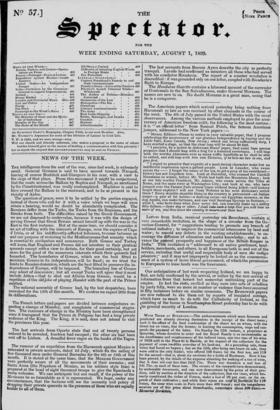WINE TRADE AT BortnEaux.—The embarrassments which were foreseen and predicted
are already showing themselves in the receipt of the direct taxes ; such is the effect of the fatal combination of the direct tax on wines, with the direct tax on vines, that the former; in limiting the consumption, stops and sus- pends the payment of the latter. On Sunday the 12th instant, a proprietor at Queyries, whose devotion to order and the Royal Family is as incontestable as the exorbitance and vexatiousness of the indirect taxes, saw two tons of his wine of 1828 sold in the Place de la Bastide' at the request of the collectors for the payment of some twelfths over-due of his land-tax. At a preceding sale, these wines had found no buyers'; but on the 12th, after being two hours on sale they were sold to the only bidder, who offered 108 francs for the first tun, and 11
i 0 for the second—that s, about six centimes for a bottle of Bordeaux. Now it has
been proved, by the details of the expense attending the making of a tun of wine, that it does not cost less than 1641. 75c. There was therefore a real loss of 54f. 75c. on each of these tuns. The owners of the vineyards have demonstrated, by undeniable documents, and can now demonstrate by the price of their pro- duce, sold by auction at the direction of the collectors, that our vines, which for- merly constituted the riches of France, make a loss of 30 per cent. on the ex- pense of their cultivation ; and while their wines are solriii3ordillit 1/0' francs, the same wine costs in Paris more than 400 francs ; and the taX-gatherer receives out of this price .about three-fourths, somewhere about 300 francs.-.. Memorial Bordelqa. It is stated that all the grain in the markets of Rouen and Havre had been suddenly bought up, with the intention, no doubt, of creating a rise in the prides. STORMS IN FRANCE, &c.—Hurricanes and 'continual rains have, since the first fortnight of July, ravaged a great part of France.. Such was the violence of thhse hurricanes at Besiers, that walls of two feet and a half in thickness were over- thrown, though they were fastened together by beams strengthened with iron. At Lyons, Geneva, and the Chaux de Fonds, in the straights of the Jura, similar effects have been produced. The night of the 8th and 9th of July was disastrous for the greater part of Switzerland, and the wind was the most violent ever known in that country. Letters from Litnoges say that the 8th of July was a day fatal to the agriculture of that department. Towards the twilight, a cloud of hail, blown by an impetuous wind, and mixed with torrents of rain, ravaged fifteen communes: everywhere, the crops of every sort were destroyed. The grass, ready to be mowed, was buried under the soil; the corn and hemp were cast to the ground, the trees stripped of their branches, the roofs of houses beaten down, and the windows broken. The hailstones were of an uncommon size ; some per- sons who could not find shelter were wounded by them, and animals left in the open fields perished under their blows. On the nights of the 15th and 16th of July, in the departments of the Aube and the Meuse, and the other departments in the vicinity of Belgium, the hailstones were of the size and shape of eggs, with rough points on them. A few moments destroyed the hope of a fine and abund- ant harvest. In eight communes there is now neither grain nor straw, nor forage of any kind—in a word no kind of crop. The commune of Viviers, situated in a very narrow valley, has been almost desolated by the torrents that rolled down from the neighbouring hills. One house was washed away by the waters and fell on an unfortunate woman, whose dread of the thunder had kept her at home. At Erry more than three leagues of land have been rendered waste. FRENCH POST.—The new arrangements at the Paris post-office for the trans- mission of letters to England have excited some interest in London, because, at a trifling additional expense, they will enable all the merchants who correspond with Paris to receive their letters as quickly as by the expresses which have been heretofore employed ; by means of which, those capitalists who chose to incur the expense, often obtained great and exclusive advantages in the money-market and in commercial transactions.



















